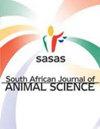饲粮中添加左旋肉碱和非诺贝特对肉鸡的影响
IF 0.6
4区 农林科学
Q3 AGRICULTURE, DAIRY & ANIMAL SCIENCE
引用次数: 5
摘要
采用因子试验研究了左旋肉碱和非诺贝特对肉鸡的影响。4个处理共4个重复,每个重复10只罗斯308肉鸡。试验为期42天。在基础日粮中添加2个水平的左旋肉碱(200和400 mg/kg)和2个水平的非诺贝特(50和100 mg/kg)。研究了胸肉的生长、胴体特性、血清成分、免疫系统反应性、盲肠菌群、感官特性和脂肪酸谱以及小肠组织学。育肥期,饲粮中添加400 mg/kg左旋肉碱和50或100 mg/kg非诺贝特的鸡采食量和饲料系数低于其他处理,体重高于其他处理。400 mg/kg左旋肉碱与两个水平的非诺贝特联合使用可降低心室脂肪(P <0.05)、胆固醇(P <0.01)、甘油三酯(P <0.05)和极低密度脂蛋白(VLDL) (P <0.05)。这些处理增加了抗新城疫(ND)和禽流感病毒(AIV)的抗体滴度。在鸡胸肉的感官特性中,实验处理仅对其香气有显著影响(P <0.05)。总体而言,推荐在罗斯308肉鸡饲粮中添加400 mg/kg左旋肉碱和50或100 mg/kg非诺贝特。本文章由计算机程序翻译,如有差异,请以英文原文为准。
Effect of dietary supplementation with L-Carnitine and fenofibrate on broiler chickens
A factorial experiment was conducted to investigate the effects of L-Carnitine and fenofibrate on broilers. There were four replicates of four treatments, with each replicate including ten male Ross 308 broiler chickens. The experiment was conducted over a 42-day period. The treatments consisted of two levels of L-Carnitine (200 and 400 mg/kg) and two levels of fenofibrate (50 and 100 mg/kg) as supplements to a basal diet. Growth, carcass characteristics, serum constituents, immune system responsiveness, cecal microflora, sensory attributes and fatty acid profiles of breast meat, and small intestine histology were characterized. During the finishing period, the chickens fed a diet containing 400 mg/kg L-Carnitine and 50 or 100 mg/kg fenofibrate had lower feed intake andfeed conversion ratio (FCR) and higher weight than the other treatments. Application of 400 mg/kg L-Carnitine in combination with two levels of fenofibrate reduced ventricular fat (P <0.05), cholesterol (P <0.01), triglycerides (P <0.05), and very low density lipoprotein (VLDL) (P <0.05). These treatments increased antibody titers against Newcastle disease (ND)and avian influenza virus (AIV). Among the sensory properties of breast meat, experimental treatments had a significant effect only on its aroma (P <0.05). In general, supplementing the diet of Ross 308 broilers with 400 mg/kg L-Carnitine and 50 or 100 mg/kg of fenofibrate is recommended.
求助全文
通过发布文献求助,成功后即可免费获取论文全文。
去求助
来源期刊

South African Journal of Animal Science
农林科学-奶制品与动物科学
CiteScore
1.50
自引率
0.00%
发文量
39
审稿时长
>36 weeks
期刊介绍:
The South African Journal of Animal Science is an open access, peer-reviewed journal for
publication of original scientific articles and reviews in the field of animal science. The journal
publishes reports of research dealing with production of farmed animal species (cattle, sheep,
goats, pigs, horses, poultry and ostriches), as well as pertinent aspects of research on aquatic
and wildlife species. Disciplines covered nutrition, genetics, physiology, and production
systems. Systematic research on animal products, behaviour, and welfare are also invited.
Rigorous testing of well-specified hypotheses is expected.
 求助内容:
求助内容: 应助结果提醒方式:
应助结果提醒方式:


